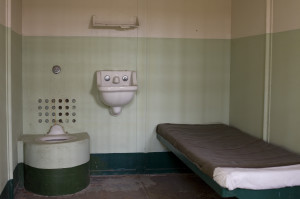When I met Deborah, she had just come home from a prison in upstate New York. Deborah, which is not her real name, had cycled in and out of prison for nearly 30 years, mostly for shoplifting– stealing expensive clothes, bagging up coats, and sunglasses.
Deborah was one of a dozen women I spoke with a for a qualitative research study on how women react to solitary confinement. I found that women respond in some unique ways. Specifically, women in prison are often survivors of sexual violence, and solitary confinement can exacerbate that trauma.
The first time Deborah went to solitary, she was being escorted to a disciplinary hearing for wearing the wrong shoes. She told me that “on the way walking to the room, in the handcuffs, [a female officer] kept lifting my arms up. She was hurting my back, so was going like this, trying to pull my back in.” This pissed off the officer. “They thought I was being aggressive but I wasn’t! And they found me guilty of disobeying a direct order.”
Deborah was put in the Special Housing Unit, or the SHU, which is one form of solitary confinement. She was sentenced to 60 days. The accommodations in solitary were pretty bare: “You go in the room,and it’s empty with just a bed, a thin mattress, a pillow that’s flat. You get 2 pants, 2 shirts, and underwear.”
And for the first few days in there, the things that bothered Deborah were mostly physical. She told me that, “You only get to shower every other day. Weekends not at all. First of all you don’t get no deodorant, no lotion.” Without lotion, Deborah would take her butter from her breakfast tray to use as moisturizer.
And once a month, women like Deborah need something “When you get your menstruation, and you need sanitary that’s where the problem comes in,” Deborah told Brown. “Everyday at 4 o’clock, the officer comes first, she’s says, oh, we don’t have sanitary. I’ll give you extra tissue. And you can go three days without sanitary using tissue.”
Deborah says these first couple of weeks were hard but bearable. But after a while your mind starts to twitch from lack of stimulation. Every woman I spoke to said that after about 2 weeks in solitary they started to feel like they were losing it. And at that point, Deborah was in a pretty dark place. Wrecked by suicidal thoughts, Deborah told me that “you just sit there thinking about your life, and if you’re thinking about your life, you’re crying.”
Deborah got so paranoid she didn’t leave her cell for her recreation time or to go take a shower. It got to the point where everything she heard outside her cell became terrifying. Every time she heard footsteps outside her door, she immediately thought someone was coming for her. “Oh my goodness,” she recalls. “What are they doing? Why they coming this way?”
“And now I’m here, I gotta stay in this room for 60 days.”
She wasn’t just afraid of the guards—Deborah was having flashbacks. The thing is, this was not the first time she’d been locked in a small room for a long time.
It all started when she was 13, she snuck out of her grandmother’s house to go to a party. “And this guy that I danced with,” she told me, “he’s like, come with me? He said he was gonna go to his house. But when we went in, it was all these guys down there. They just did what they wanted to. Oh and I was crying. I just laid there and cried.”
Deborah didn’t tell anyone she’d been raped. But he didn’t leave her alone. He’d come to her grandmother’s house, her school. “I was really afraid of him, so I would go, I would go,” she said. “And one day he came to my grandmother’s house, and I left and never came back home.”
Deborah says that she was worried he was planning to do the same thing to her sister. “My sister’s so pretty,” she told me. “And I didn’t want them to do that to her. “
As for her grandmother, she just let her go. Deborah told me that everyone, including her grandmother, just thought she was staying at her boyfriend’s house.
He used to lock me in the apt, I would have to stay in the house, don’t let her leave. And this went on for 5 years. And throughout the 5 years if I would try to leave, I would get beat.
It was during this time that Deborah says she started stealing. “When I would steal, it was like I was invisible,” she remembered. “So it’s great to be invisible isn’t it? When that happened to you, and you think you so ugly that you don’t look in the mirror.” She’d steal expensive clothing, jewelry, and coats. “Because if I had the finest thing on, then that covered up everything,” she told me.
Out of the twelve women I talked to, nine of them had a story like Deborah’s. It’s difficult to independently verify these stories, but the research supports this. It’s estimated that 80% of women in prison have a history of physical or sexual abuse. And a report in the journal Criminal Behavior and Mental Illness found that women in prison have at least 3 times as much PTSD as men in prison.
These traumas come roaring back in solitary. There’s no stimulation or human interaction, so your senses become heightened. Normal benign sounds, like footsteps down the hall, become louder and more intense. Remember how Deborah told me that she felt like heard everything outside her cell, only louder?
 This happens all the time to people deprived of stimulation. But if you have PTSD, these little sounds can become traumatizing. The adrenaline starts pumping. Each little sound can trigger the same physiologic reaction of the original trauma.
This happens all the time to people deprived of stimulation. But if you have PTSD, these little sounds can become traumatizing. The adrenaline starts pumping. Each little sound can trigger the same physiologic reaction of the original trauma.
When Deborah remembers being afraid in solitary of footsteps, it was him she was thinking about. “If someone’s walking, it’s him! Like him coming, you know.” She was back in that room, waiting for him to come home and to beat her.
Deborah relived her trauma throughout the entire two months she spent in solitary. You’d think she’d be thrilled to finally get out. But she says the time in there changed her.
Before solitary, Deborah told me, “I used to love going around, women come to me with their problems. I worked with the chaplain.” But when she got out, she didn’t know how to be around people. “I didn’t want nobody. I didn’t want the chaplain.”
“Sometimes you just want to go right back in! And it’s crazy, you wanna go back in where you don’t want to be.”
It was so difficult to be back around people that Deborah wanted to go back to solitary. “I walked off my unit and went to another unit. Knowing that I can go back to SHU,” she told me, “And I was mad, because I only got 15 days. I just wanted to stay away.”
Since then, Deborah cycled in and out of prison 3 more times. It’s hard to say whether solitary kept her in that cycle of trauma and crime, but it clearly didn’t help either. Deborah was released last year, again. She’s back in Brooklyn now.
Production Notes:
This story was reported by Annie Brown and edited by Michael May. Jonathan Hirsch produced the sound design and worked with Simone Seiver and Kirsten Jusewicz-Haidle on post-production. Our intern, Kirsten Jusewicz-Haidle, produced the additional segments.
Thanks to the Mount Sinai School of Medicine and the Correctional Association of New York.
© Copyright 2015 Life of the Law. All rights reserved.









